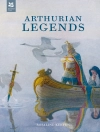In ‘Puck of Pook’s Hill, ‘ Rudyard Kipling weaves a captivating tapestry of English folklore and history, blending fantasy and realism in a manner that invites readers into the magical realm of Sussex. The narrative revolves around two children, Dan and Una, who, while playing in the lush countryside, encounter Puck—a mischievous spirit who brings historical characters to life. Richly imbued with Kipling’s signature storytelling, the book contrasts the innocence of childhood with profound historical themes, showcasing the author’s adeptness with narrative forms and his ability to invoke the sublime beauty of England’s landscapes profoundly. The episodic structure allows for a seamless interplay between myth, nature, and literary allusions, placing it firmly within the late Victorian literary revival that sought to reconnect with indigenous British folklore. Rudyard Kipling, born in India, was deeply influenced by the stories and cultural narratives of both his Indian upbringing and his English heritage. This duality informed much of his work, and in ‘Puck of Pook’s Hill, ‘ he showcases his fascination with stories that transcend time and encapsulate the essence of national identity. Kipling’s life experiences, including time spent in the English countryside, lend authenticity to the vivid landscapes and rich characterizations in this enchanting work. ‘Puck of Pook’s Hill’ is highly recommended for readers who appreciate the convergence of history and fantasy, as well as those intrigued by traditional storytelling. Kipling’s intricate language and imaginative plots provide a delightful exploration of the past, making this collection a timeless piece for both children and adults alike.
About the author
Rudyard Kipling (1865-1936), born in British India, was an influential English writer, famously known for his works of fiction, poetry, and short stories. His literary style often reflected imperialist themes, overlaid with elements of fantasy, allegory, and a keen observation of human nature and society. A hallmark of Kipling’s writing is his deep understanding and vivid depiction of the British colonial experience, coupled with deep insight into the culture and people of the subcontinent. Kipling’s ‘Puck of Pook’s Hill’ (1906) is a notable example, presenting a tapestry of historical fantasy. Here, he intertwines elements of English folklore with real historical figures, delivering powerful short stories and poems that delve into England’s past with reverence and imagination. His narrative technique in the book reflects his broader literary practice, which often blurred the lines between reality and fantasy, a stylistic approach that was innovative for his time. Kipling was awarded the Nobel Prize in Literature in 1907, the first English-language writer to receive the honour, recognized for his remarkable contributions to literature, which also include classics such as ‘The Jungle Book’ (1894) and ‘Kim’ (1901). His works continue to be celebrated and scrutinized for their complex interplay of morality, duty, and cultural identity.












